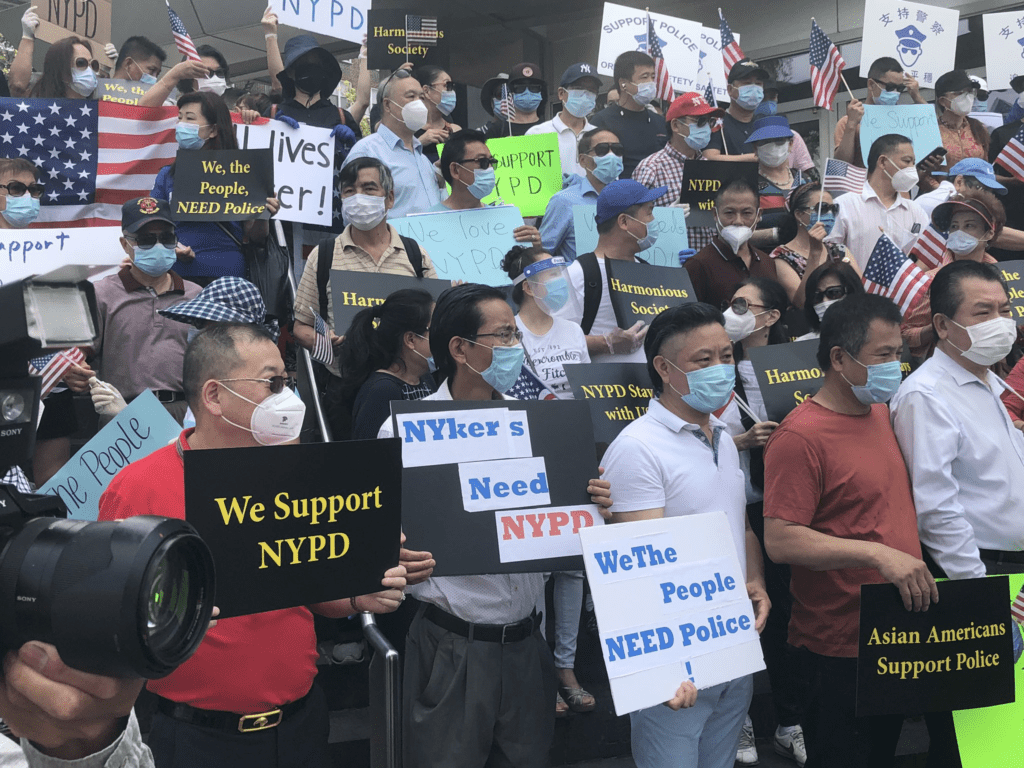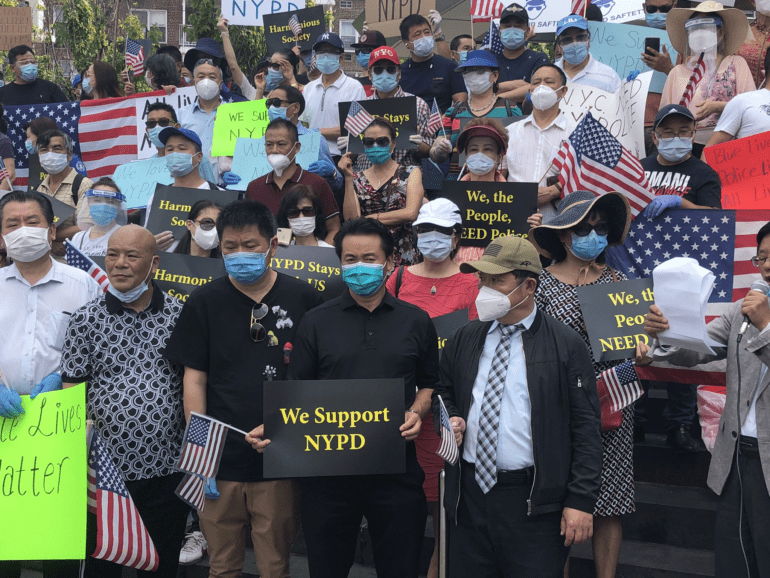Read this article in Chinese.
As Black Lives Matter protests swept through the country with the ambitious call to defund the police, a group of Chinese immigrant organizations held a rally in Flushing, New York to support the New York Police Department (NYPD) in the nation-wide struggle. The rally, held on July 3, was attended by hundreds of Chinese immigrants from the area. The scene was littered with “All Lives Matter” signs.
During the pro-NYPD rally in Flushing, a coalition of Asian grassroots organizations held a counter-protest to show support for the Black Lives Matter movement and promote Asian-Black solidarity. This coalition included the Asian American Feminist Collective, the China Democracy Party, Chinese for Black Lives, the Flushing Anti-Displacement Alliance, MinKwon Community Center, and Red Canary Song.
Kate Zen, cofounder of Red Canary Song, spoke with Lausan editor JS about the counter-protest, misinformation on WeChat, and the prevalence of Chinese conservatism.
JS: Why did Chinese immigrants hold a pro-NYPD rally in Flushing?
Kate: The rally in Flushing was organized by a variety of Chinese American immigrant groups who, in response to the ongoing Black Lives Matter movement, came out to express their support for the NYPD. After the surge of anti-Asian hate crimes during the first few months of the coronavirus outbreak, Chinese American immigrants felt that mainstream media had failed to acknowledge or support them as victims of these violent racist attacks.
Some of the more visible anti-Asian attacks were perpetrated by Black people, like the incident when an Asian man was sprayed with febreze on the subway. As a result, many on Chinese social media channels commented that they need the police to protect them from Black-on-Asian violence. This viewpoint has only been exacerbated by the use of disinformation on WeChat among Chinese American immigrants. One video that spread like wildfire is the one of a Brooklyn woman who was burned with acid while taking out the garbage, which many commenters were convinced was perpetrated by a Black man, even though this is not clear from the video footage.
Several Asian American groups on Facebook voiced the need to show “Asian strength” by purchasing guns, and standing up for Asian victims. A recent rally for an 89-year-old woman in Brooklyn who was set on fire, organized by China Mac, called for a more aggressive response from the Asian community because Asian politicians aren’t standing up enough for their own communities: “We must no longer sit back and allow this to happen. We cannot be quiet and docile any longer.”

China Mac is also affiliated with the Asians in America group, which helped campaign for police officer Steven Lee, who ran for electoral office in Flushing using the “Asians for Black Lives” protests as a way to promote himself as a “reform cop.”
Comments on WeChat and Twitter related to “黑命贵”, a deliberate Chinese mistranslation of “Black Lives Matter,” show that many Chinese nationals living in the US genuinely believe that without police protection, Asian Americans will be the ones most hurt by Black targeting of Asian stores and robbery of Asian people. Therefore, they believe it is necessary to show support and gratitude to police during the Black Lives Matter movement, because they genuinely feel that American society is unfairly demonizing police.
JS: Who was behind the pro-NYPD rally?
Kate: The first pro-NYPD rally on June 22 on social media was led by Chinese real estate groups. When we and our friends, along with members of the Flushing Anti-Displacement Alliance and Queens DSA, heard news on WeChat about the second pro-NYPD rally on July 3, we knew we had to organize a counter-protest to show that there are also many Chinese people who also support the Black Lives Matter movement.
Like the first, this second pro-NYPD rally was also organized by real estate and business owners, with strong messaging that pitted Black Lives Matter against pro-business interests. The rhetoric they use to justify their pro-police stand is very much about protecting property and businesses, and ultimately protecting class interests. Even local City Councilmember, Peter Koo, used the term “Business Lives Matter” in substitution for Black Lives Matter. Though he later had to apologize for this politically incorrectness, he knows very well that it is this point of view that actually best panders to his Chinese political base in Flushing.
With pro-NYPD sentiment so widespread among the Chinese immigrant community in Flushing, we knew we were going to be way outnumbered. Nearly 400 people showed up on the pro-NYPD side, but we were also pleasantly surprised that about 100 people also showed up to our counterprotest, which ultimately took over the steps after the other side had left.

The same real estate groups and business interests that support the NYPD and oppose the Black Lives Matter movement, have also pushed sex workers out of 40th Road, the long-time Red Light District of Flushing, because they complain that sex workers lower their property values. Not surprisingly, these are the same groups that we (at groups like Red Canary Song and the Flushing Anti-Displacement Alliance) have organized against.
It wasn’t only property/business owners who organized the pro-NYPD rally. Several Chinese community groups including various Hometown Associations (同乡) were also core organizers of the event. These groups, designed to connect Chinese immigrants with their hometowns in China, have close connections with the Chinese Communist Party (CCP) in China and are firm supporters of law and order.
Additionally, there were also anti-CCP groups who wore MAGA hats and carried pictures of the American flag during the rally. Because Chinese and US politics don’t line up, people who are critical of the CCP can also be very pro-US/pro-capitalism.
The Hong Kong protests last year heightened the Chinese American immigrant community’s political awareness. On both sides, the Hong Kong movement was used to validate pro-police sentiment. Anti-CCP groups adopted a pro-US rhetoric resulting in support for the US administration and hence the NYPD, while those who opposed the Hong Kong movement took up the mantle of law enforcement, also resulting in the support of the NYPD.
JS: How did these Chinese American immigrants develop right-wing politics?
Kate: My parents are anti-CCP dissidents. For American politics, this translates into support for Trump and more broadly, capitalism. Today, they watch Guo Wengui (AKA Mile Kwok of GTV media) who translates a lot of Bannon and Trump rhetoric for a Chinese American audience. Indeed, Fox News is one of the most popular news channels for Chinese American immigrants. Like Trump supporters, many now think that everything they see in mainstream reporting is fake news.
A critical moment for the development of Chinese American conservatism was during the debate on affirmative action. With universities adopting affirmative action policies, Chinese Americans felt like their children were being robbed of their rightful place at the best colleges and that these coveted spots were being given to “less deserving” Black students who may have had worse academic results.
The point of education hits home for so many Chinese Americans because there is also a cultural aspect—a Confucianist ideology that preaches education as the only way to rise out of poverty and to the top. This kind of mentality maps onto conservative rhetoric that values success in a similar way. Both subscribe to meritocracy and the idea that those who are successful are only successful because they’ve worked hard. However, this also means that the right can also easily take advantage of these Chinese immigrant values and slip in racist beliefs—such as the stereotype that Black people are lazy.
JS: How has conversative media won over of Chinese immigrants? And what can progressives and leftists do to counter these strategies?
Kate: To understand the formation of Chinese American conservatism, we have to understand that Chinese immigrants are marginalized in American society. Because a lot of their struggles do not align with mainstream liberal concerns, their struggles are often invisibilized. That’s why right-wing media has been so effective at courting Chinese immigrants.
Take the tricky issue of policing as an example. Unlike the white/fascist pro-police marches that we’ve seen throughout the country, Chinese immigrants genuinely feel like they are the victim of criminal activity. WeChat has only exacerbated this feeling given the amount of media about Black violence being circulated among these groups. Right-wing conservatives are then able to prey on Chinese American immigrants’ marginalization and win them over into adopting a pro-police stance.
This means that during Chinese immigrant advocacy work, we need to be really intentional about making sure these immigrants feel heard. On the subjecting of policing, we’ve found it more useful to start our conversation around the topic of police corruption and violence.
But this is only the first step to more dialogue with them. Chinese immigrants know that the police aren’t good to Asians. They themselves have often encountered situations where they are treated poorly by the police because they don’t speak English fluently. So the conversations we need to have with them are really to start drawing the connections between these struggles and those of Black people.




